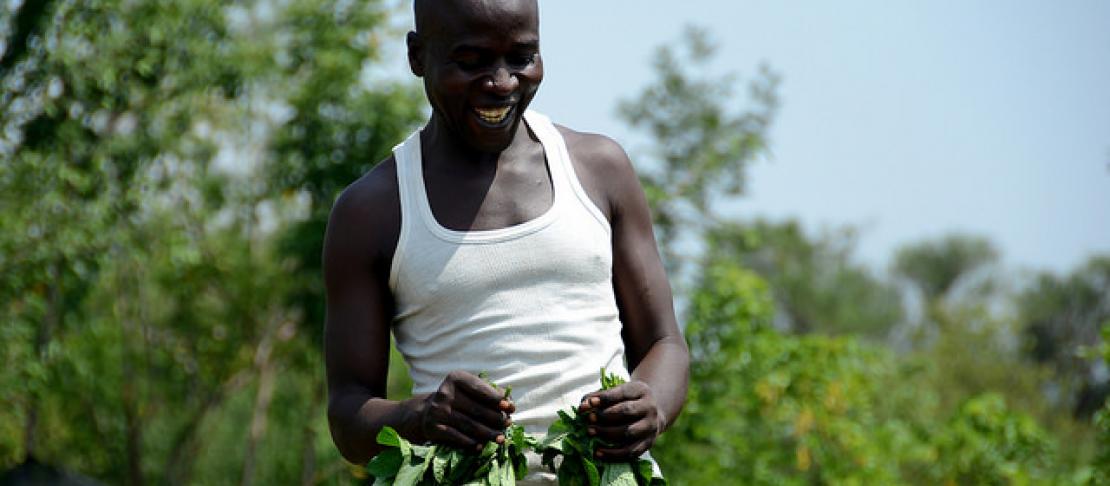Partnering with Nordic countries for climate action in agriculture

Engaging governments, investors, farmers and research for climate action in agriculture
COP22 is not only a place for high level international negotiations. It’s a summit of leading thought leaders, advocates, policymakers, academia, and more. It provides a unique opportunity to increase global collaboration surrounding today’s most innovative initiatives to address climate change. In this context, the Nordic Council of Ministers, the Nordic working group for global climate negotiations, CCAFS and COWI organized a high level event on “Agriculture initiatives and COP22”.
Hosted by the New Nordic Climate Solutions Pavilion, Honourable Kimmo Tiilikainen, Minister of Agriculture and the Environment of Finland opened the event. Dhanush Dinesh and Simon L. Bager presented project findings of the Agricultural Initiatives and COP22 to a crowded room and five outstanding panelists from around the world. Panelists represented some of the most innovative global agricultural initiatives working to combat climate change.
A dynamic discussion followed the presentation, moderated by Dr Tony Simons, Director General of the World Agroforestry Centre (ICRAF), and panelists weighed in on some of the world’s most pressing challenges, including the role of international organizations, tensions between improving agricultural productivity in a sustainable manner, reaching the most vulnerable, and more.
Pivotal to the conversation was the role of Nationally Determined Contributions (NDCs) and the role large international organizations will play in mainstreaming climate into all investments. Director of the International Fund for Agricultural Development's (IFAD) Environment and Climate division, Mrs Margarita Astralaga, pointed to strengths including the large amount of financial institutions present in the developing world. While they are making important investments that are improving lives, it is vital that investments account for climate change. Investments considering climate change make good business sense, and NDCs are a roadmap for steering these investments in the right direction.
The Ms Fhumulani Mashau, Projects Officer at the Southern African Confederation of Agricultural Unions (SACAU), noted that including the poorest farmers as key stakeholders in program design will ensure that policies are in the best interests of those who will ultimately carry them out. Smallholder farmers are not strangers to the challenges of climate change, but providing mechanisms that allow participation and buy-in are key to increasing their efficacy. It’s important to speak in an accessible language that farmers can readily identify with.
Ms Anette Friis, Head of Program Coordination for the CGIAR Research Program for Climate Change, Agriculture and Food Security (CCAFS), highlighted the importance of monitoring progress and alignment with NDCs. Part of the challenge of Paris is verification, as there are no binding or streamlined requirements or guidelines for countries. Ms Friis pointed to a specific initiative CCAFS works on, which is improving household gender equality. By encouraging co-decision between men and women in a household, productivity will increase.
However, it’s important that global policy-makers and researchers do not reinvent the wheel. Ms Mashau impressed upon attendees that global leaders must not assume farmers don’t know what they’re doing. We should use resources to reduce inefficiencies and create a balanced reward system for farmers who are successful in new and alternative approaches to challenges including unfair compensation resulting from an inefficient supply chain.
However, as touched on by the Honorable Luis Felipe Arauz-Cavallini, the Costa Rican Minister of Agriculture, cultural barriers must be accounted for. Cultural barriers are not only encountered at the farmer level – they’re common at the level of financing as well. It’s important that global leaders work to make climate-smart agriculture a good investment for national banks and investing agencies. Sustainability should be seen as an opportunity as opposed to an obstacle. Mrs Astralaga followed up on this, noting that a recent report from the World Bank found that only three percent of global climate funds are routed towards agriculture. If we continue along at business-as-usual, agriculture will account for 60 percent of global greenhouse gas (GHG) emissions.
Climate change not only jeopardizes global agricultural production, it puts farmer livelihoods at high risk and creates challenges to ensuring global food security. By scaling up successes such as those showcased by CCAFS and other participants at COP22, farmers have a better chance of weathering the storms and building lives that are fair and abundant both at home and around the world.
Watch the recording of the event:
Elizabeth Minchew is a student at the Fletcher School of Law and Diplomacy, Tufts University. Click to read more coverage of CCAFS events at COP22.
